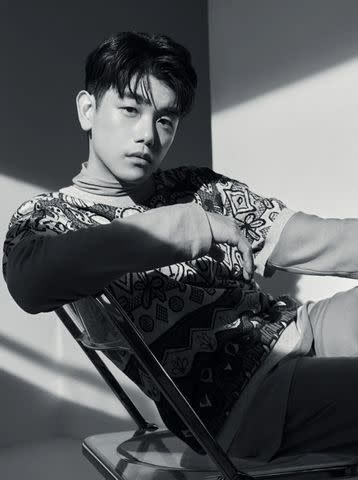Eric Nam Is Opening Up New Conversations About Mental Health
- Oops!Something went wrong.Please try again later.
A Verywell Mind 25 Honoree

Photo by Kanya Iwana
From catchy tunes and impressive performances to intensely devoted and organized fanbases, K-pop is a cultural phenomenon that is transforming the lives of Asian Americans and even those around them. Eric Nam is at the forefront of it all.
With over a decade in South Korea’s entertainment industry, Nam is a multifaceted entertainer, singer, songwriter, and TV personality. He is the host of the number one K-Pop podcast, “Daebak Show,” where he frequently discusses mental health, cultural identity, and personal growth.
Plus, Nam co-founded DIVE Studios with his brothers to create culturally driven content, community and connection between the K-pop industry and its fans. In 2021, they launched Mindset, a daily self-care app that strives to improve the way people take care of their mental health.
We connected with Nam to get his perspective on current mental health attitudes, his advice for men struggling to take care of themselves, and who he personally leans on for support.
Mental Health of Asian Americans
It is estimated that Asian Americans have a 17.3 percent overall lifetime rate of any psychiatric disorder; however, they are three times less likely to seek mental health services than Whites.
In 2019, suicide was the leading cause of death for Asian/Pacific Islanders, ages 15 to 24, according to the Office of Minority Health. In addition, Asians were 60 percent less likely to have received mental health treatment as compared to non-Hispanic whites in 2018.
Crisis Support
If you are having suicidal thoughts, contact the National Suicide Prevention Lifeline at 988 for support and assistance from a trained counselor. If you or a loved one are in immediate danger, call 911.
For more mental health resources, see our National Helpline Database.
Men’s Mental Health
From cultural norms, social expectations, and feelings of embarrassment or shame, men are less likely to receive therapy or counseling and open up about their mental health struggles. Additionally, Asian American males in grades 9 to 12 were 30 percent more likely to consider attempting suicide compared to their non-Hispanic white counterparts in 2019.
Nam emphasized that "mental health is at the beginning and end of everything we do and who we are. It affects everything about us — our work, our fun, the way we love, our families, and our communities."
“To be the fullest and best version of who you are, you must care for your mental health . In the same way that you are supposed to take care of your physical health by eating well and working out, we should be actively caring for our mental health. There should be no shame in being active in caring for our internal, emotional, and mental health,” said Nam.
Related: Understanding the Suicide Rate in Men
Nam on Improving the Relationship With His Family
Asians are more reluctant to seek help due to several factors. It’s been shown that Asian Americans experience more difficulty expressing emotions, are less open to talking about suicide and mental illness, and struggle to communicate with their family members more than their White counterparts.
While Nam's relationship with his family took a lot of work to get to where it is today, it is now based on honesty and openness with each other. When it comes to getting advice or guidance, Nam shared that he leans on his family the most. His parents and two brothers are important resources in his life.
“[B]eing willing and able to just open up the conversation a few years ago really allowed us to dive deeper into making sure we are looking out for each other‘s mental health," shared Nam. "It’s always just the beginning that’s awkward and uncomfortable, but once you get through it, you’ll realize how incredible it is to have people you love and cherish as your closest advisors, mentors, and ears."

Photo by Ko Won-tae
Related: How to Have Healthy Family Relationships With Less Stress
Music and K-pop Influences on the Mental Health Landscape
For Asian Americans who grew up in the '80s and '90s, it was almost impossible to find an artist on the Billboard chart who looked like them. The widespread popularity of K-pop has made Asian faces more visible and representative in Western media. They are confronting Asian stereotypes head-on and creating communities where Asian Americans feel seen and heard.
Explainer
K-pop fans may experience benefits in their quality of life. A study showed that young people (11 to 20 years old) who idolize K-pop celebrities scored “Good” for each dimension of quality of life, including physical health, psychological, social relations, and environment. The researchers explained that K-pop fandoms create a sense of unity, and listening to their songs helps young people deal with stress and depression. The lyrics make them more confident and motivated to love themselves.
Nam’s music often touches on themes of emotional struggle, resilience, and self-acceptance. His songs that delve into personal and vulnerable topics resonate deeply with his listeners, offering them comfort and a sense of being understood.
Nam shared that attitudes towards mental health have drastically changed to be more open and accepting since he entered the music industry over 13 years ago. He’s seen this not only in music but in many industries and cultures overall.
“I think music is a medium through which conversations around mental health can be shared, and I’m glad that having these conversations is increasingly becoming normalized,” shared Nam.
On the Mindset App
Mindset is a comprehensive daily self-care app designed to transform mental well-being maintenance into a simple, engaging routine. The app includes resources like meditations, sleep stories, journaling prompts, and guided breathing exercises. Mindset provides expert-led content on a broad range of topics, including stress management, depression, self-esteem, and more, ensuring a well-rounded approach to mental health.
Each day starts with a themed “Daily Mindset” episode, empowering users to cultivate a positive mindset in just five minutes. Mindset provides exclusive audio collections from celebrities like members from Seventeen, Tablo of Epik High, Catriona Gray, and Julia Michaels, sharing personal mental health experiences and relatable lessons and offering unique insights into self-care practices.
“Our goal [for Mindset] has been to encourage our fans and community to be open, honest, and candid about their mental health and to have influential figures willing to share their struggles and successes in handling their mental health and overall life has been inspiring, comforting and encouraging,” shared Nam.
Takeaway
Eric Nam is transforming the mental health landscape through the power of celebrity influence and shaping cultural conversations about wellness. His multifaceted approach helps ensure that his message reaches a diverse audience, making mental health care more accessible and appealing to young people and generations to come.
Read the original article on Verywell Mind.

